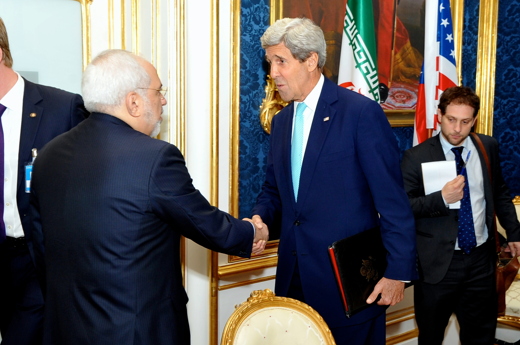On November 25, one day after the conclusion of Vienna nuclear talks between Iran and six world powers, Haft-e Sobh, a daily, featured a front-page column by Arash Khoshkhoo on the negotiations. What comes below is the translation of the piece in its entirety:
It seems we have encountered an enormous change in the concept of American hegemony. Halfway through the second decade of the third millennium, America, a superpower which abandoned its glorious yet infamous imperialistic position after the collapse of the Soviet Union, is gripped by complicated economic and political woes, calls by multinational corporations for greater shares, and above all jitters about riding out a crippling economic crisis. Such entanglement has seen the US plunge from the position of the global village chief into a steward.
That spells trouble for the theory that prescribes talks with the global village chief rather than others in order to have the issue of sanctions settled. What village chief? The one who is unable to make a decision even when the opportunity presents itself in the form of one-on-one talks? The chief who is hastily summoned by a wealthy Saudi prince so that no measure is taken against the wishes of the rich in Saudi Arabia?
What makes John Kerry, who serves as the secretary of state of the village chief, fit in an unplanned 30-minute meeting on board the private jet of Saudi Foreign Minister Prince Saud al-Faisal? What is the nature of economic relations between Saudi Arabia and American political circles? Why was US Vice President Joe Biden forced to call and implicitly apologize to the UAE and Qatari emirs and the Turkish president one day after he made comments critical of the role of the UAE, Qatar, Turkey in supporting ISIL? [a reference to Joe Biden’s speech at Harvard University on Oct. 2 where he said, “Our allies poured hundreds of millions of dollars and tens of thousands of tons of weapons into anyone who would fight against al-Assad.”]
What kind of a village chief America is that at the beginning of each round of negotiation it tasks one of its top diplomats to launch a charm offensive to appease Benjamin Netanyahu and [Israeli Justice Minister] Tzipi Livni? Who is America? Why has the scary giant been so degraded that for every symbolic air strike against ISIL, it has to make public a bill of costs?
Let’s forget that 14 months of talks, always embellished with promising projections at sensitive times only to let down hopeful watchers with the final statement, has once more come to an end. A journalist with The Guardian tweeted that for some unknown reasons nuclear talks have been deadlocked since Sunday. Maybe the answer lies in the meeting between John Kerry and Saud al-Faisal.
Now we should believe in a new concept of America which no longer appears as a superpower running a one-man show, rather it is a corporation whose shares have been bought by Arab sheikhs, Israel and other investors during its transition from an economic crisis. Even Turkey and France now view themselves as entitled to buying its shares and see their viewpoints have an impact. What all these shareholders have in common is that they are afraid of a powerful Iran.
It’s time to thank Dr. Zarif and his team. On the back of their 14-month efforts, many economic knots have been untied and a different image of Iran has been presented to the world. Presence of hundreds of thousands of American and European tourists in Iran which gets $5 billion in revenues from tourism industry is the fruit of such endeavors.
However, it is high time we believed that bilateral meetings with America won’t go anywhere. This America is just a member of the board, not a CEO, not the chairman, and not a village chief. It is a junior manager, just a steward.
